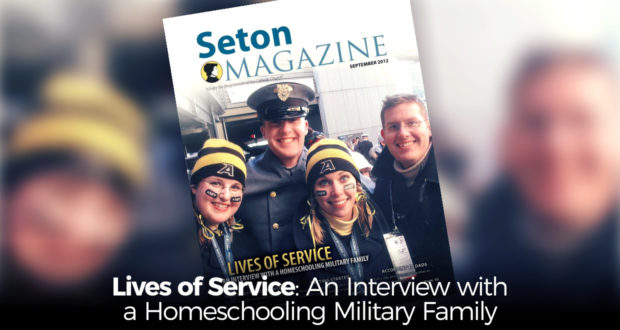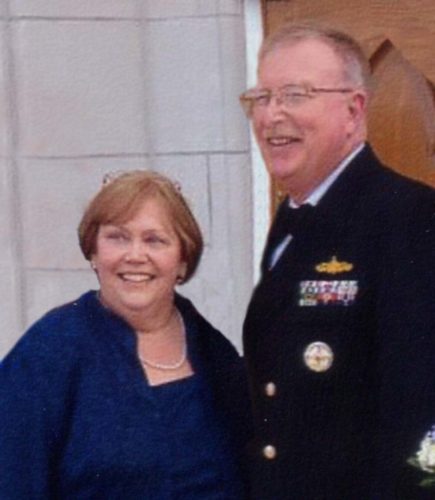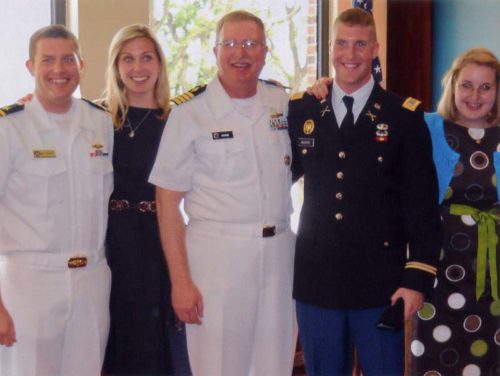Seton is proud to have had the honor to interview one of our families who serves in the Armed Forces.
The Adams Family of New Market, Maryland, has a son and a daughter serving in the Navy, another son in the Army, and their youngest daughter is on the way to Fordham. Captain Adams has served honorably in the Navy for 26 years.
Captain Adams, why did you choose a Navy career?
My father served in the Army during World War II and the Korean War, and all three of my uncles served in the Navy. In grammar school, I was fascinated by ships and a devotee to the television show “Victory at Sea.”
After earning a Ph.D. and completing a post-doctoral fellowship, I initially taught at a pharmacy school but always yearned to fulfill my boyhood dream of being a Navy Officer. At the age of 34, I joined the Navy as a biomedical scientist.
Captain Adams, what advice would you offer to other parents about having their children choose a lifestyle of military service?
Military service is a vocation just like the religious life or the health professions. Just as priests minister to our spiritual health and health professionals minister to our physical health, the military ministers to our corporate physical health, protecting the nation from foreign enemies.
And like the religious and medical vocations, the military life requires selfless service and a keen sense of honor, courage, and commitment. Members of the U.S. Military offer the nation their lives, their fortunes, and their sacred honor.
- Captain and Mrs Adams
- John Adams receives his commission at Westpoint
Mrs. Adams, what would you offer to parents?
Military service is an honorable profession and I am so proud of the desire of my children to serve their country…something bigger than their own personal ambitions.
One of my husband’s mentors always said, “The Navy is important because the country is important; the country is important because it’s where my family lives.”
Mrs. Adams, how do you handle the pressures and concerns of having your children in harm’s way?
Pray. I know that there is risk in everything we do, but I pray that God will protect them and keep them safe, especially when they are deployed.
Mrs. Adams, would you reflect on the concerns of a mother having a daughter choose the military life?
I have concerns for all my children, period, whether daughter or son. All have been deployed: William as a submariner, Maura as a nurse in Kuwait, and John as an Infantry officer in Afghanistan. I also have a new daughter-in-law who was deployed in Kandahar for a year before she married my son John.
It certainly is a difficult life for all service members, a life filled with hardship, separation, and sacrifice. I now have Margaret who will be attending Fordham in the fall. She feels it’s her turn to join them in the service of our country and she has joined the NROTC unit there. I am proud of all of them for serving and for being willing to deploy.
Captain Adams, what advice would you offer families about Seton’s potential role in helping them achieve a military career?
Seton has helped all of my children obtain an elite Catholic education, far better in quality than that available in public schools or Catholic schools. All four have gained admission to top quality colleges: the US Merchant Marine Academy, Villanova University, the US Military Academy, and Fordham University.
The values taught in the Seton curriculum, when brought to the military by Seton graduates, reinforce the traditional military virtues of duty to God and country, and enlarge the Kingdom of God on Earth.
Interview with Maura Adams
How did Seton help prepare you for NROTC?
I can remember the trepidation I felt as I stood outside on Mendel Field in formation the first day of school at Villanova University. I worried that I would be at a disadvantage from my fellow Midshipmen who had belonged to clubs and sports teams during their high school careers; I was not sure if I had been fortified by Seton with the appropriate tools to survive not only college, but also in the Naval Reserve Officer Training Corps.
I was soon surprised that the discipline instilled in me through Seton’s intensive curriculum had given me an edge compared to the other students. I was able to rely on the excellent writing skills and study habits formed at home, and the strict foundation of the Seton program allowed me to draw on skill sets that my colleagues lacked.
I found that Seton had been the perfect school to help me prepare for the discipline of the military and helped me to prioritize my time in college.
After your active duty experience, would you want your own children to follow in your footsteps?
Following in my own father’s footsteps, I have been honored to serve my country. For the past 9 years I have worn the uniform of the United States Navy, and have been proud to serve as a Navy nurse for the last five of those years.
The skills I have learned, the knowledge I have gained, the experiences, good and bad, have all shaped me and developed my own character. With honor, courage and commitment as its core values, the Navy tradition in my family has been one I have been proud of and would hope to instill into my own children.
How have the Catholic values that you learned from your family, and through Seton made an impact on your career?
Ironically, I feel that the Navy has strengthened the Catholic values of my family. With our many moves and changing of duty stations, it was our love for the Lord and one another that made us a strong family unit.
Seton Home Study School and being homeschooled brought us even closer together. In turn the faith that I have held so dear that has been nurtured by these experiences has made me a compassionate nurse and helped me to see the Lord in those around me. I am proud of my country, proud of my faith, and proud of where I came from.
Interview with John Adams
How did Seton help prepare you for a military academy?
The most important skill Seton taught me was the ability to write clearly and concisely. That skill has paid dividends both at West Point and in the Army. West Point put a lot of emphasis on writing ability, including 5 courses in the core curriculum focused on critical and analytical writing.
I always received praise for my writing style and content, all of which I learned during high school with Seton.
After your active duty experience, would you want your own children to follow in your footsteps?
I hope that with my experience and the contributions of all our soldiers, sailors, airmen, and Marines that my children won’t have to serve because there will be no need. However, this is an imperfect world and there is always danger to our lives and liberty.
Should any of my children express a desire to serve and defend this nation we call home, I would show nothing but support for their decision. I am deeply proud of my family and its military history.
My dad’s experiences allowed me to grow up all over our great country and see things most people won’t get a chance to in a lifetime.
How have the Catholic values that you learned from your family and through Seton made an impact on your career?
I didn’t know how important my faith was until I got to West Point.
Despite the regimented lifestyle, heavy course load, and mandatory weekend obligations, there was always room for trouble. The Catholic chaplain and chapel staff, however, supplied cadets with numerous programs to bring cadets together and provide guidance as we navigated the treacherous road of undergraduate life.
I met some of my best friends on the Catholic Plebe (freshman) Retreat and over the next four years we went to Sunday Mass, did Knights of Columbus, and celebrated our milestones together. I am stationed at Fort Campbell with some of those friends and we still plan out our Mass schedule so we can go together.
In the Army, my faith is no less important than it was at school. It is very easy for soldiers to make fun of the Catholic Church because of scandals or Hollywood portrayals, and the soldiers of my platoon were no different. However, after being with them for a few weeks, the general attitude towards any religion changed.
One of my team leaders, who had been particularly hostile, approached me after a little while and started asking about the Faith. I asked him why he changed, and he said that no one had ever challenged what he was saying or made him think about it until I took over the platoon and he realized that he was saying some awful things. I ended up reenlisting this soldier and he is one of my best subordinate leaders.
The knowledge from Seton religion classes and the instruction my parents provided allowed me to serve as a witness to my faith and defend it from the ignorant masses, both at school and in the Army. As a result, I have some great friends, great memories, and I feel that I have affected the organization of my platoon and company through example.
Interview with William Adams
How did Seton help prepare you for a military academy?
Seton prepared me for my experience at a military academy by providing a complete high school curriculum, ensuring that all aspects of my education were covered, and by providing someone who could objectively grade my work external to my family.
While the courses I took at a local community college in math and science were beneficial as these subjects became more difficult, the strong foundation in writing and critical thinking I developed with Seton have served me very well in college and afterward.
After your active duty experience, would you want your own children to follow in your footsteps?
I would be proud of my children if they pursued a career in the military, as it is one of hardship and sacrifice that many of the people who enjoy the freedoms we protect do not understand or appreciate.
Regarding my children attending a military academy, I think it is an outstanding way to be exposed to the concept of service to others while juggling the demands of a heavier workload than most civilian colleges.
How have the Catholic values that you learned from your family, and through Seton made an impact on your career?
There is actually a great deal of overlap between the ideals espoused by the military and those taught by the Catholic Church, such as self-sacrifice, obligation to do right, protect and care for those unable to do so for themselves, and conduct yourself with honesty.[/toggle]
Interview with Margaret Adams
As a graduating senior heading to Fordham University, did you seek an appointment to a military academy?
Actually, I received a Congressional Nomination to West Point, as well as presidential nominations to both West Point and the Naval Academy.
I did finish the long application process to both academies, and was waitlisted at West Point, and offered a spot at the Naval Academy Preparatory School (NAPS). I applied for an NROTC scholarship, as well. I would have been honored to attend either academy.
As a graduating senior, what can you offer to other families about how Seton has helped prepare you academically, and for important life decisions like which college to choose?
Seton has prepared me in many ways. Throughout the entire process of college applications, and of seeking nominations and scholarships, I had to write countless essays, and Seton English certainly prepared me for that and for the SATs.
Seton has helped me stay organized and to complete my assignments thoroughly, which was a huge help. However, the thing I find most helpful about Seton is the objective grading. The graders at Seton offered me their unbiased critical opinions of my work, helping to make me a better student, and more prepared for the tough graders at college.
Do you have any other comments for Seton and Seton families?
Coming from an accredited home-study school made a massive impact on college applications. Since everything is online now, in an application you had to pick your high school from a list of all the accredited high schools in the country.
Seton was always on the list and I never had any problems, whereas if your high school wasn’t on the list, you had to go through an entire process of proving you went to school.
Though Seton is challenging, it is completely worth it, and it all pays off.

 Seton Magazine Catholic Homeschool Articles, Advice & Resources
Seton Magazine Catholic Homeschool Articles, Advice & Resources



